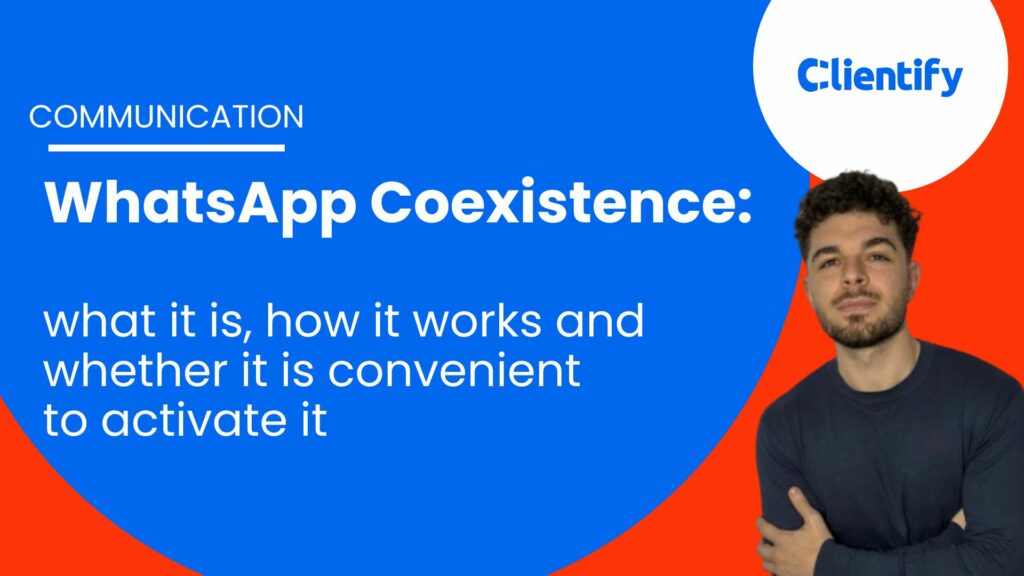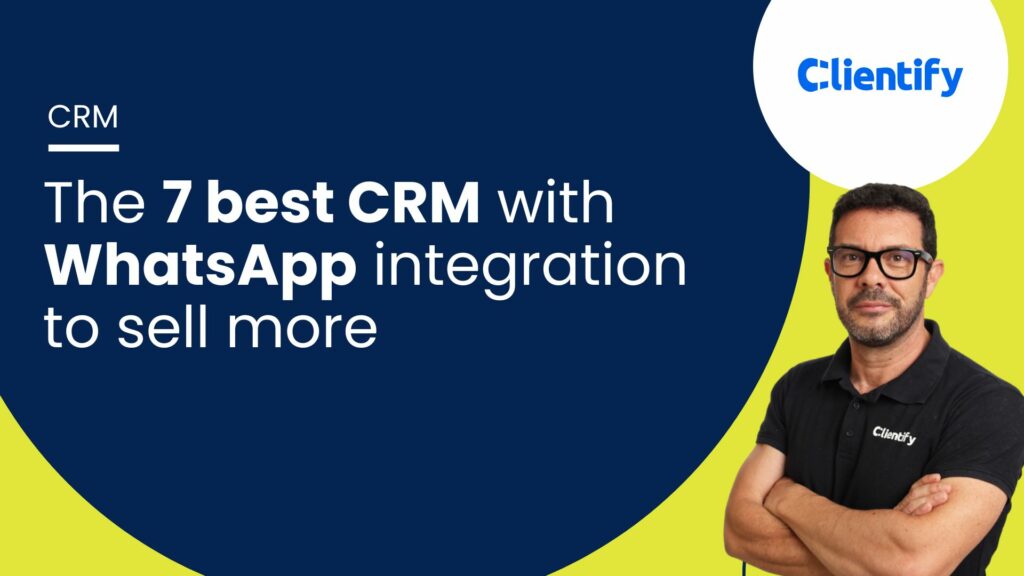You know that WhatsApp is everyone’s favorite channel, especially for people looking to contact a company.
And that’s where the problem arises. When your company tries to manage customer messages on WhatsApp, only from the app.
How can you not sell if you are using WhatsApp? Precisely, managing messages in this way causes chats to pile up, conversations to get lost and follow up to be missed.
The good thing is that, both in Spain and LATAM, the use of WhatsApp Business API is growing, and more and more SMEs are looking for a CRM for WhatsApp that allows them to centralize customer messages in a single folder and respond quickly and organized.
Key ideas:
- What is a CRM for WhatsApp
- How to manage your customers’ WhatsApp messages
- What to consider when choosing a CRM for WhatsApp
- What are the mistakes to avoid in the management of your messages?
- Why Clientify is the ideal CRM for WhatsApp
What is a CRM for WhatsApp?
A CRM for WhatsApp is the tool that connects your WhatsApp conversations with all the external information you have about your customers.
In addition, it is responsible for managing WhatsApp customer messages, so that in this way, the message history is saved in the CRM, you can assign the conversations to the team specialist, add tags that help you identify the type of customer and perform a more professional and orderly follow-up.
On the other hand, when you integrate your channel with a CRM for WhatsApp, you not only have all conversations centralized. You also have the possibility to measure how your customer service is working, improve response times and give each customer a much more personalized experience than with the traditional app.
Think about this… with the traditional WhatsApp app you have to depend on your cell phone, be alert to answer one by one and, not being able to distinguish the importance of the messages, many new leads will probably end up escaping due to the lack of response.
And be careful, because with WhatsApp Business the same thing happens a bit. It is true that you have a little more control by having labels, programming quick responses and even the ability to send a product catalog, but it is still quite limited when working in a group.
As we said before, the biggest change here is noticeable when you connect WhatsApp with a CRM. There you have a unified tray where all chats are centralized and you can manage them collaboratively.
In addition, you can create automation flows, send marketing campaigns, customize responses with the data you already have in the CRM and follow up on each conversation.
So, if you want to see how to apply all this, I recommend our WhatsApp Marketing article and the guide that shows you the comparisons between WhatsApp API and WhatsApp Business.
Advantages of using a CRM for WhatsApp
Using a CRM with integrated WhatsApp completely changes the way you manage conversations with your customers. The important thing is that your chat is no longer cluttered, and you have a single tray, with complete histories so you can respond faster and offer a more personalized treatment.
Organization: labels, priorities, assignments
A CRM is key when it comes to managing WhatsApp conversations. It allows you to use tags to classify messages, assigneach chat to the most appropriate person in your team and prioritize those that can’t wait.
This way you avoid having different people replying to the same customer, or worse, having an important message go unanswered.
Automation: quick responses, automatic messages, welcome flow
Automation is one of the most important steps.
This type of CRM with Whatsapp integrated, allows you to set up quick responses for frequently asked questions, send automatic WhatsApp messages to confirm orders, appointments or follow-ups, and you can even design a series of welcome messages to be sent to each new lead, automatically.
History and context by customer
With a CRM for WhatsApp, every conversation is recorded in the customer’s file. This means that you can see at a glance what you talked about, what they bought, when was the last time you wrote to them, what stage of negotiation they are in, etc.
The important thing about having this history at hand is that it allows you to provide a much closer and more personalized treatment.
Integrations with other channels or services
The best thing about a CRM for WhatsApp is that it integrates with other channels. You can also connect it with email, social media or even phone calls to have a complete view of each customer in one place.
In addition, you can integrate your calendars, invoicing systems or ecommerce, in order to activate an automatic but personalized follow-up.
Improved customer service and increased conversions
If you think about it, all of these features are key to making the customer more satisfied and closing more sales.
By managing WhatsApp customer messages in a quick and organized way, you improve response times and quality of care…and when customers feel that you take care of them well and on time, then sales increase.
How to choose the ideal CRM for WhatsApp
There are a lot of CRMson the market that centralize WhatsApp messages…but that doesn’t mean they all do the same thing.
There are many tools that may seem ideal at first, but eventually fall super short.
And that’s where Clientify makes the difference, because in addition to having a native integration with WhatsApp Business API (and being the ideal CRM for WhatsApp), it is an all-in-one platform that offers communication, sales and marketing functionalities.
Essential functionalities:
If the CRM you choose does not have a unified WhatsApp Inbox, tag and filter management, team chat assignment and automations, the same will happen as with the traditional app.
But Clientify has all this and much more: you can even design and send WhatsApp marketing campaigns, create automated message flows and even analyze the metrics of your conversations.
Scalability:
Yes, today you receive 20 messages a day and you can handle it alone, but what are you going to do when you get 200? What if you need other people to help you respond?
A good CRM like Clientify is rightly designed to allow multiple users to work and respond at the same time, without duplicating responses and always keeping the history of each conversation in their contact file.
Price vs. return:
It’s easy to look only at the price of the CRM license, but what really counts is the return it gives you. A cheap platform that doesn’t help you close more sales is expensive in the long run.
But in this case, with Clientify you save hours of manual work, reduce response times and convert more chats into revenue. That’s why a platform like this helps you recover your investment much faster.
Legal and safety aspects:
Be careful, because using unofficial connectors or unreliable solutions can jeopardize your WhatsApp account and the trust of your customers.
So, as a tip…choose a platform that has a native integration with META, such as Clientify, which connects directly with WhatsApp Business API and complies with all security and data protection regulations such as GDPR.
So you can manage messages with complete peace of mind, knowing that your customers’ information is secure.
Practical guide: managing customer messages on WhatsApp with a CRM (step by step)
Well, we already talked about the advantages of using a CRM with WhatsApp…so now I leave you a detail of how to organize your messages, to optimize your time and provide a much closer and personalized attention.
Initial configuration:
The first thing you have to do is to connect your number to the WhatsApp Business API from the Clientify INBOX.
As we said before, you can add several channels to the Inbox, but in this case you choose the WhatsApp API option, verify the requirements, authenticate with your Meta Business Manager, link your account and in a few minutes everything is ready.
And if you already work with Cloud API, don’t worry, because you can add the line without losing your history.
That’s it! Now…you can start managing your customers’ WhatsApp messages.
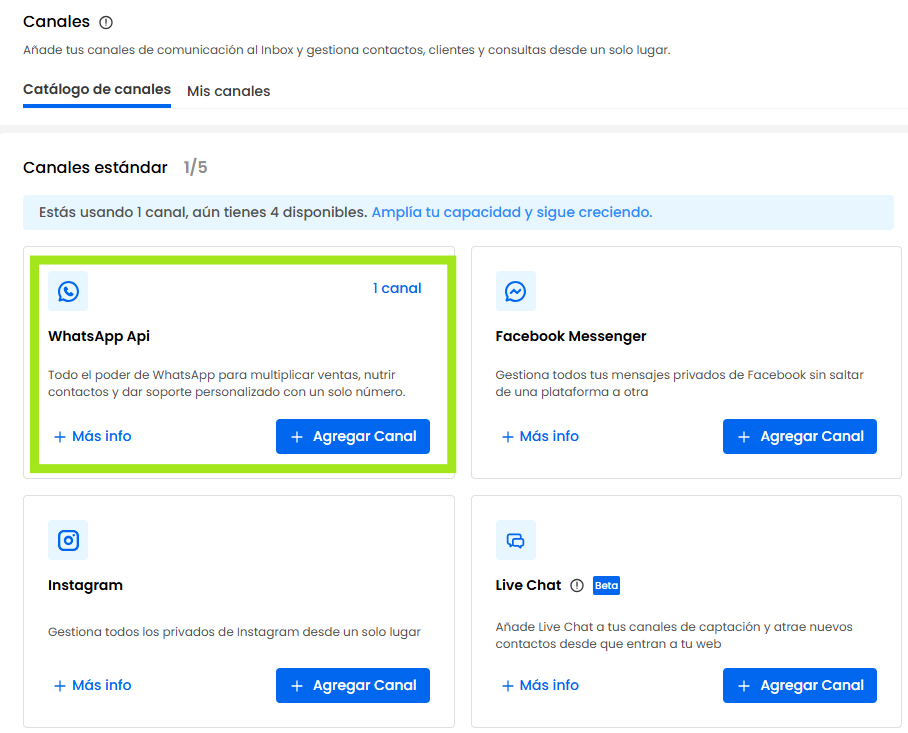
Organizing trays, assignments and equipment:
The good thing about Clientify is that it gives you the possibility to assign each contact that enters through WhatsApp to the correct specialist, apply a label to differentiate it and even leave an internal note so that the team always has an idea of the context.
On the other hand, since all the conversations arecentralized in the Inbox, you have available the contact’s personal data, which user is working on it, in which purchase situation he/she is in, etc.
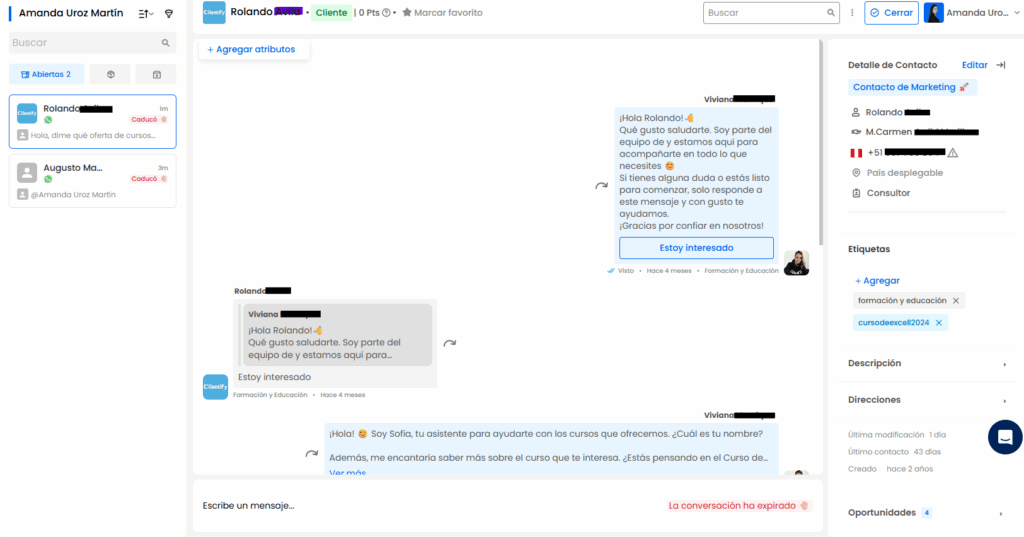
Automating responses and recurring messages
Clientify also allows you to generate an AI chatbot to connect with your WhatsApp. It can trigger quick answers to frequently asked questions, give more specific answers, answer in a human and close way and even automatically refer the query to a member of your team.
On the other hand, you have the possibility to design and send WhatsApp campaigns, in a massive and personalized way; and to send follow-up messages automatically.
The important thing to note is that these automatic shipments comply with META’s legal policies.
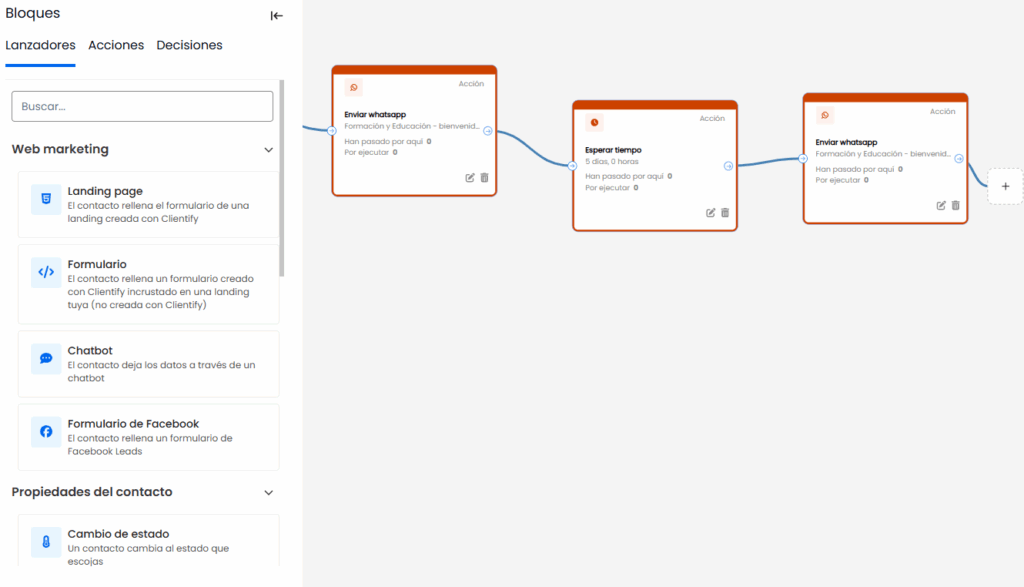
Prioritizing with filtering, labels and response times
There’s nothing better than having your conversations organized. And with Clientify you can filter by channel, user, label or status, set key conversations and activate an automatic message detailing the time of attention. In this way, you always give priority to what is urgent and prevent a chat from being “on hold”.
In addition, Inbox features allow you to organize and find conversations in a couple of clicks, even when the volume of conversations is super high.
Conversation follow-up and closure
The good thing about having statuses like “Open”, “Frozen” and “Closed” is that there is a high chance that you have nothing pending.
And with this type of control, you can understand who needs an urgent contact, what type of message should be sent, if there are possibilities of converting that contact into a customer, among other things; achieving a very clear and transparent process in order to close more sales with greater satisfaction.
Case study: how to improve your customer service and sales using Clientify
If you have an online store, then you will surely feel identified with Ivan. He, as a freelancer in the USA, had his cell phone exploding with WhatsApp messages that he never got to answer. He attended to them as best he could, but continually losing sales led him to hire Clientify.
The first thing he did was to connect the WhatsApp API to our CRM so we could quickly, but correctly, manage all the conversations.
And the good thing is that Clientify also allowed him to integrate his ecommerce, which helped him to have a more complete view of what was happening with each customer.
In addition, being able to design WhatsApp and email marketing campaigns allowed him to communicate in a personalized and automatic way with all those contacts who had left their shopping cart abandoned and to send promotional messages to their buyers.
Amazing how a single platform with all these features can help you increase your sales: “It is an excellent CRM, I increased my sales thanks to them with their email marketing tools and WhatsApp, plus the good integration they have with ecommerce…”
7 common mistakes to avoid
Pay close attention to these mistakes…because avoiding them, in the management of your WhatsApp messages, is what will make the difference between losing or winning a new sale.
- No tagging or filtering of conversations: Not classifying chats makes it seem like everything is urgent…but still, nothing moves forward.
Define labels according to customer stage, type of query or priority, and use filters to focus on what really needs to be answered at that moment; this way you avoid wasting time and confusion.
- Answering everything manually: If you keep copying, pasting and composing messages, sooner or later you’re going to go crazy. That’s why it’s best to create quick replies and automatic templates for FAQs, confirmations and reminders.
This way you maintain your personal tone and reduce response time.
- Not respecting the 24 h window of WhatsApp Business API: Trying to write out of time, without the templates approved by META, is what causes your number to be blocked and, as if that were not enough, generates a very bad experience.
That’s why you have to prepare templates, not only to reopen conversations, but also to keep your communication within the rules.
- Do not record the history in the CRM: If conversations are left on your mobile, then don’t expect to sell or build loyalty.
Take advantage of tools such as Clientify that save every interaction in the contact’s file, so you have at hand behaviors, purchase history, complaints, next steps and results.
- Neglect security and legality: Using unofficial connectors or connectors that do not comply with the RGPD exposes you to blocking and sanctions. Always hire platforms that work with the official API and make sure you always ask for consent.
- Do not automate follow-ups and closings: Unfortunately, with the tasks we have on a daily basis, memory often fails us. Therefore, if you rely on remembering everything, you have a good chance of missing opportunities.
Schedule post-quote reminders, satisfaction surveys and closing messages to advance each conversation with a prospect until they become a customer.
- Don’t measure performance: Don’t expect any improvement if you don’t know what you are doing.
Analyze your response times, see how many conversations you resolved and how many were left pending, how many contacts that came in via WhatsApp you managed to convert and continue working together with your team to optimize the processes.
7 of the most frequently asked questions
What is a CRM for WhatsApp?
A CRM for WhatsApp connects your WhatsApp Business API with your database to manage customer messages on WhatsApp in a professional way. Centralize chats in a unified inbox, assign conversations to your team, use tags and filters, automate follow-ups and save the history in the contact’s record.
So you go from chatting with customers, to working with processes, metrics and real context in every interaction.
2. How does a CRM help me to respond faster on WhatsApp?
It gives you quick responses, approved templates and real-time alerts so that no chat escapes. Plus, you can assign managers, prioritize by urgency and view customer context without switching screens.
With everything in one place, you reduce average response time, maintain message quality and increase customer satisfaction from the first contact.
3. Can WhatsApp messages be automated with a CRM?
Yes. You can trigger welcome messages, appointment or order confirmations, reminders and satisfaction surveys. You also reopen conversations outside the 24-hour window with WhatsApp Business API approved templates.
The key is to automate the repetitive without losing the human tone: the CRM uses the contact’s data to personalize each mailing and keep the conversation flowing.
4. How much does a CRM with WhatsApp integration cost?
It depends on the plan and if you use the official API. Normally you will pay for the CRM license, the users you need and, depending on the provider, the cost per number or per WhatsApp conversation.
The important thing is to look at the return: if you organize your inbox, respond faster and convert more chats into sales, the investment will pay off in a few weeks.
5. Which businesses benefit the most from a CRM for WhatsApp?
Any company that receives a lot of messages and needs to follow up on them. It tends to work especially well for travel agencies, schools, real estate, clinics and beauty salons, ecommerce and professional services.
If today you manage queries from personal mobiles or lose conversations due to lack of process, a CRM with WhatsApp helps you to scale without losing quality.
What is the difference between WhatsApp Business and the API integrated in a CRM?
WhatsApp Business adds tags and quick replies, but is intended for basic use. The official API integrated into a CRM allows you to work as a team with shared tray, advanced automations, verified templates, performance metrics and conversation tracking in the customer record.
7. Can I use my current number and migrate without losing my history?
You can bring your number into the WhatsApp Business API and connect it to the CRM, as long as it is not linked to any other WhatsApp account. From the moment you connect them, everything is recorded in the CRM with context, tags and responsible parties.
It is advisable to plan the transition, warn your customers and start with templates and workflows already prepared.
Conclusion
Let me give you a tip…you can no longer manage your WhatsApp client conversations manually.
Implement a CRM that allows you to centralize chats, automate responses and follow up with each customer, without losing history or opportunities.
And remember, the important thing about a CRM with WhatsApp like Clientify is that it helps you organize conversations, so you can prioritize what’s important and offer a more professional service.
Take advantage of the 14-day trial period to implement these features and turn every message into a sales opportunity.


